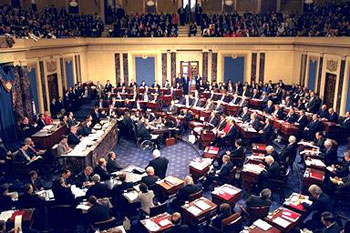 No American with a TV or an internet connection has been able to ignore the race for president this year (or last year, for that matter). But depending on where you live, the race for your state’s Senate seat may be equally heated.
No American with a TV or an internet connection has been able to ignore the race for president this year (or last year, for that matter). But depending on where you live, the race for your state’s Senate seat may be equally heated.
More than twice as many currently Republican seats are up for election this year as Democratic seats, which gives the Democrats a chance to rebuild a majority. In theory, at least. If Hillary Clinton wins the White House, the Democrats will need to net four additional seats to do so (since the vice president breaks Senate ties); if Donald Trump wins, they’ll need five.
Can they do it? Maybe.
My current best guess lets the Republicans hold on to their majority, but only just. And many of these races are close – potentially even closer than polls are indicating. For instance, as I write this post, FiveThirtyEight gives Wisconsin’s Republican incumbent, Ron Johnson, almost no chance of carrying the state. But anyone who remembers how Gov. Scott Walker fared there in the face of determined efforts to unseat him has reason to be less sure. In fact, Walker has stepped up his support for Johnson in recent weeks, calling his race the most important in the state overall. Wisconsin may largely come down to the Democratic turnout on Election Day.
There are some races that are relatively easy to call, of course. Republican Marco Rubio will keep his Florida seat, as will John McCain in Arizona. Ohio incumbent Rob Portman also seems likely to keep his seat in Republican hands. On the other hand, Republican Mark Kirk seems almost sure to lose Illinois based on current projections; his penchant for verbal gaffes has hurt his campaign, including recent remarks about his opponent’s Thai heritage (for which he subsequently apologized).
Evan Bayh, the former Indiana senator and governor, unexpectedly chose not to seek re-election to his Senate seat in 2010 and was well-liked at the time he stepped down. This year, however, he has faced resistance when he stepped in to fill the gap left by Democrat Baron Hill. Bayh’s faltering lead has dwindled to effectively nothing, leaving him and his Republican opponent Todd Young neck-and-neck. My presidential scenario from Friday gave Trump Indiana, so I’ll venture to say the Democrats will not succeed in picking up a seat here.
Missouri and North Carolina are both toss-ups. In general, in close races you will be wise to bet on the incumbent. That would keep both these states in Republican hands – and Republicans really do need to keep both of these states as an insurance policy, in case they lose seats elsewhere. For instance, it seems that Democratic challenger Katie McGinty could unseat Republican Pat Toomey in Pennsylvania, especially given her support from high-level members of her party on the campaign trail.
All of this means that Senate control could come down to the results in two states: New Hampshire and Nevada. Current Sen. Harry Reid is retiring, leaving his Nevada seat vulnerable to a Republican challenge. The symbolic victory of picking up the outgoing minority leader’s seat has made Nevada an especially important Republican goal this fall. If Trump wins Nevada, as I speculated he might on Friday (though it is no sure thing), it is hard to imagine Republican Joe Heck losing. When we picture Republicans splitting their vote, pretty much no one imagines someone voting for Trump for president and turning around to support a Democrat for senator. Republicans would really love to take Nevada for additional reason; it would solidify their grip on the majority, especially in combination with wins in Missouri and North Carolina.
What about New Hampshire? Polls recently favored favor Democrat Maggie Hassan over the Republican incumbent, Kelly Ayotte. But Hassan’s projected margin of victory is narrow, suggesting voter turnout could prove a major deciding factor in this race. I’ve given it to the Democrats in my projection, but it is hardly a sure thing, even this close to Election Day.
My projections for tomorrow land us with 49 seats in Democratic hands and 51 seats remaining with the Republicans. But the Democrats could manage to squeeze out a majority despite my expectations. They will need to hold Nevada, avoid blowing an election in either Wisconsin or New Hampshire, take Illinois and Pennsylvania as expected, and – if Trump wins – pick up one more seat. Indiana, Missouri and North Carolina are all possible, and FiveThirtyEight’s models have shown all these races as neck-and-neck throughout October save Indiana, which only tightened recently. Given how close many of these races are, tomorrow’s results are still anybody’s game.
Disclaimer: This page contains affiliate links. If you choose to make a purchase after clicking a link, we may receive a commission at no additional cost to you. Thank you for your support!



Leave a Reply